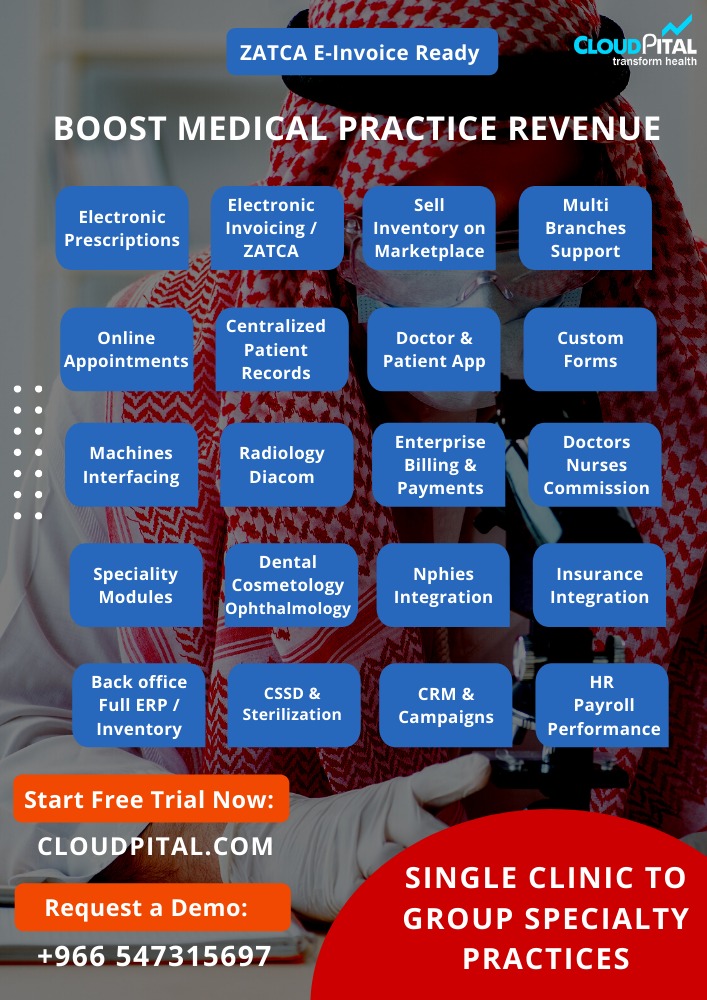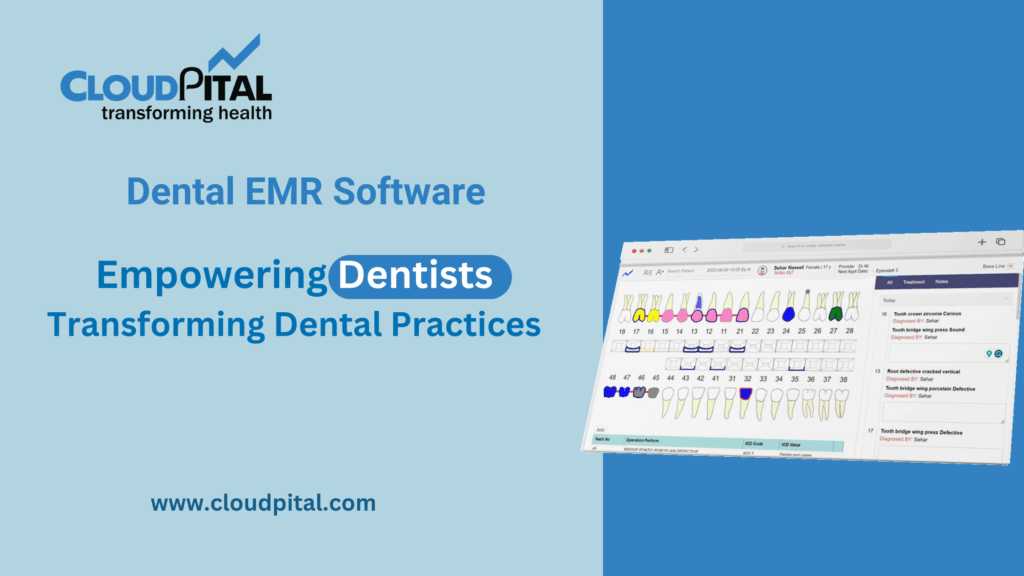Cloudpital # 1 is one of the top EMR systems of healthcare services, and the adoption of Electronic Medical Record systems represents a major technological advancement. The digital platforms promise increased efficiency, better patient care, and simplified processes. However, behind their impressive appearance lies a myriad of issues that healthcare professionals must master. From technical challenges to resistance from the culture, the integration of EMR systems in healthcare facilities is fraught with challenges.
Click to Start Whatsapp Chatbot with Sales
Mobile: +966547315697
Email: sales@cloudpital.com
Cloudpital # 1 EMR systems

What challenges are faced when implementing EMR systems?
Technical Complexity
EMR systems are complex electronic ecosystems, which require strong technological infrastructure as well as seamless integration with other systems. Healthcare providers frequently face issues related to compatibility with old systems, data transfer and interoperability. Making sure that data transfer is smooth patient information from paper records in electronic forms without jeopardizing security or accuracy is a difficult job. Additionally, maintaining the functionalities of EMR systems in the face of updates patches, updates, and changing technology standards requires constant vigilance and knowledge.
Financial Constraints
The introduction of EMR systems requires significant financial commitments, including fees for licensing and hardware upgrades, as well as training for staff, as well as ongoing maintenance expenses. For a lot of healthcare institutions particularly smaller practices and rural clinics the financial burden that comes with EMR implementation can be overwhelming. Finding funding and distributing resources in a way that is appropriate while also balancing multiple priorities with tight budgetary restrictions is a daunting task.
Resistance to Change
Human behavior is innately not able to adapt and the healthcare industry is no different. Implementing EMR systems alters routines and workflows. This can trigger fear and reluctance from healthcare professionals. Nurses, physicians and other administrative personnel may consider EMR implementation as an invasion of the autonomy of their staff, work productivity or even their job security. To overcome this, it is necessary to implement complete change management plans with effective communication and active engagement with stakeholders to build buy-in and establish an environment of acceptance of technology.
[/vc_column_text][/vc_column][/vc_row]
What challenges are faced when implementing EMR systems?
Workflow Disruption
charting frequently disrupts current processes for clinical care, resulting in temporary dips in productivity and operational inefficiencies. Healthcare providers have to review and rethink processes in order to meet the demands of the new framework of digital technology that is time-consuming and disrupting to the patient’s treatment. In order to balance the need for complete change with the need for maintaining continuity of care takes careful planning, constant adjustments, and flexibility to deal with unexpected issues.
Data Security and Privacy Concerns
The digitization of patient health records, comes an increase in concerns over security of data and privacy. EMR systems are able to store sensitive data which must be protected from unauthorised accessibility, breaches of data or cyber-related threats. Healthcare providers must follow strict regulatory frameworks like HIPAA (Health Insurance Portability and Accountability Act) to ensure confidentiality of patient data and ensure data integrity. Implementing strong security measures and conducting periodic risk assessments, and instilling the culture of cybersecurity awareness is essential to reduce the risk of weaknesses.
Interoperability and Standardization
The absence of standard information formats as well as interoperability guidelines is an issue that hinders the seamless exchange of data between various healthcare providers and service providers. EMR systems are often operating in silos, which hinders coordination of care as well as clinical decision-making and the continuity of care for patients. Interoperability requires collaboration between all stakeholders, compliance with interoperability standards like HL7 (Health Level Seven) and investments in interoperable technologies like Application Programming Interfaces (APIs) and Health Information Exchanges (HIEs).
Staff Training and Support
The success of the implementation and use of EHR systems rest on the confidence and competence of healthcare professionals to use the digital tools efficiently. Complete training programs that are specifically designed to meet the needs of different users, continuous technical assistance, and access to documents that are user-friendly are the key elements of an effective EMR strategy for implementation. Insisting on continuous education and training will ensure that healthcare professionals can harness their full power of EMR systems to provide top-quality healthcare to patients.
Conclusion
Although the use of EMR systems has great potential in transforming healthcare delivery, it’s not without its difficulties. From technological complexities to the cultural barriers healthcare providers face numerous challenges to successfully integrate these new platforms into their practice. By taking proactive steps to address these issues by fostering collaboration between all parties, and applying best practices, healthcare institutions can leverage the potential that comes from EMR systems to improve the outcomes of patients, boost efficiency in operations, and spur innovations in the delivery of healthcare.
Click to Start Whatsapp Chatbot with Sales
Mobile: +966547315697
Email: sales@cloudpital.com
EMR systems
EMR systems
EMR systems
What challenges are faced when implementing EMR systems? similar software solutions prices were updated on 2025-07-02T04:29:33+00:00 in Saudi Arabia in Mecca, Medina, Riyadh, Khamis Mushait, Yanbu, Jeddah, Dammam, Unaizah, Uqair, Ha’il, Ta if, Al Bahah, Dhahran, King Abdullah Economic City, Najran, Diriyah, Qatif, Khafji, Jubail, Abqaiq, List of Cities and Towns in Saudi Arabia, Ras Tanura, Turubah, Jazan Economic City, Knowledge Economic City, Medina, Khobar, Abha, Tabuk, Saudi Arabia, similar software solutions prices were updated on 2025-07-02T04:29:33+00:00 We also provide in Saudi Arabia services solutions company in Hafar Al-Batin, Udhailiyah, Al-Awamiyah, Hofuf, Hautat Sudair, Buraidah, Tayma, Duba, ‘uyayna, Saihat, Al-Kharj, Al-ula, Jizan, Rumailah, Ar Rass, Arar, Shaybah, Al Majma’ah, Rabigh, Dhurma, Haradh, List of Saudi Cities by Gdp Per Capita, Badr, Sudair Industrial City, Baljurashi, Shaqraa, Al-Khutt, Habala, Ad Dawadimi, Dawadmi, Layla, similar software solutions prices were updated on 2025-07-02T04:29:33+00:00 Price is SAR 100 and this was updated on updated on 2025-07-02T04:29:33+00:00 similar What challenges are faced when implementing EMR systems? software solutions prices were updated on 2025-07-02T04:29:33+00:00 in Saudi Arabia in Haql, Afif, Al-Abwa, Farasan, Al-Jaroudiya, Thadig, Al-Thuqbah, Al Wajh, Almardmah, Al-Zilfi, Muzahmiyya, Prince Abdul Aziz Bin Mousaed Economic City, Tharmada’a, Skaka, Um Al-Sahek, Sharurah, Tanomah, Bisha, Dahaban, Al Qunfudhah, Qurayyat, Saudi Arabia, Ha’ir, as Sulayyil, Al Lith, Turaif, Al-Gway’iyyah, Samtah, Wadi Ad-Dawasir, Az Zaimah, Safwa City, Jalajil, Harmah, Mastoorah, Hotat Bani Tamim, Jabal Umm Al Ru’us, Rafha, Qaisumah, Al-Ghat, Hajrah, Al-Hareeq. Excerpt: Jeddah (also spelled Jiddah, Jidda, or Jedda; Arabic: Jidda) is a Saudi Arabian city located on the coast of the Red Sea and is the major urban center of western Saudi Arabia similar software solutions prices were updated on 2025-07-02T04:29:33+00:00 Price is SAR 100 and this was updated on updated on 2025-07-02T04:29:33+00:00
1-2-2023




